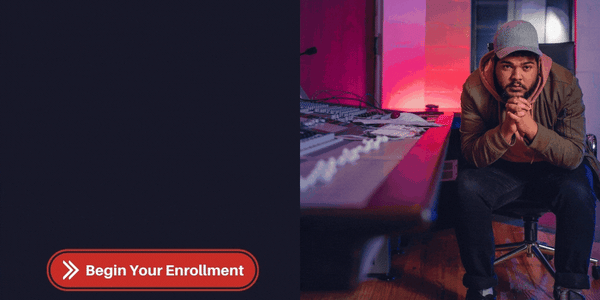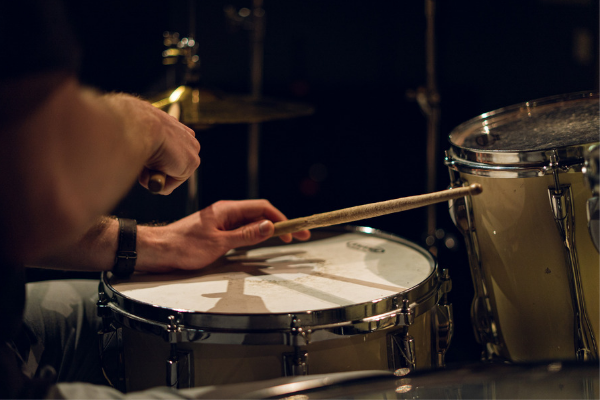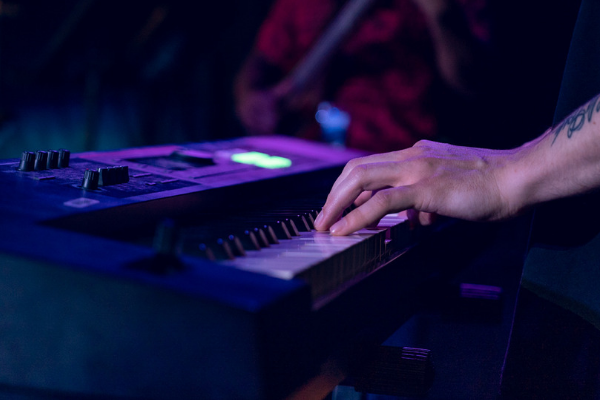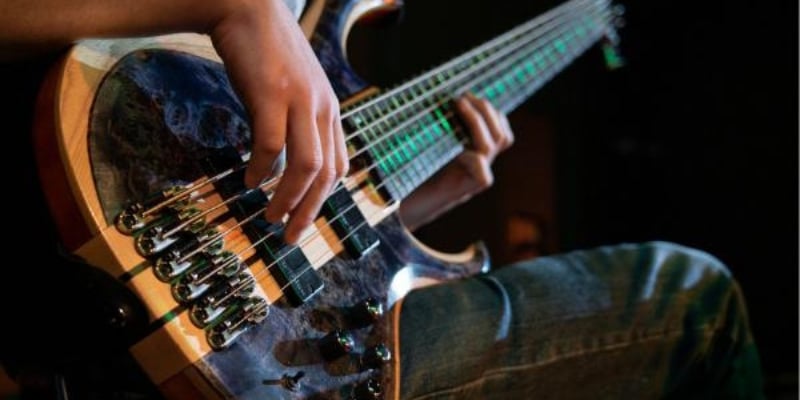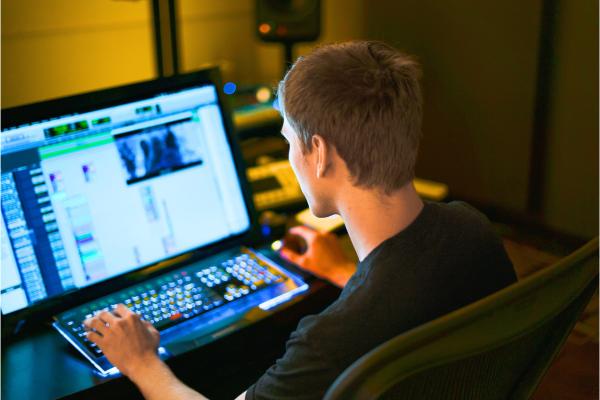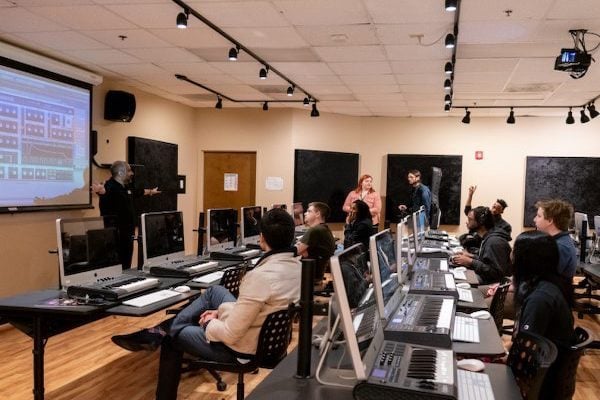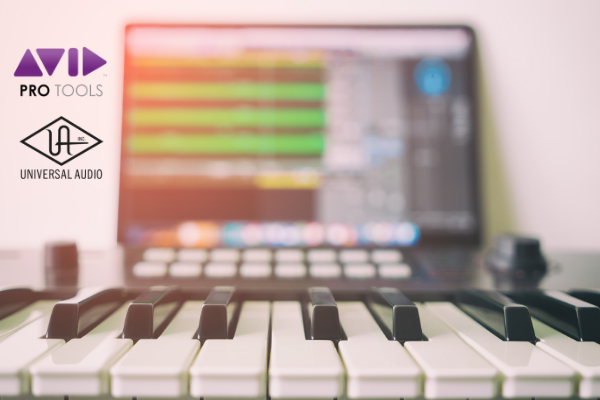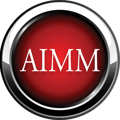Music Production and Audio for Media Associate Degree

Associate of Applied Science in Music Production and Audio for Media
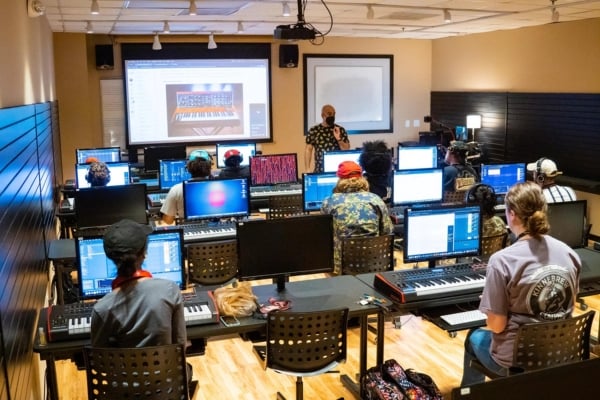
If you’re looking to push your technical skills to the next level through intricately designed courses that further your recording and engineering abilities, then the Associate of Applied Science in Music Production and Audio for Media Program is perfect for you.
For those wondering how to get a degree in music production, the Atlanta Institute of Music and Media provides a comprehensive music production degree.
Atlanta Institute of Music and Media provides a degree in music production to students with the instructional environment necessary to develop both their technical and creative talents. This approach to education ensures students acquire the skills necessary to advance their musical aptitude and gain knowledge in the field of Music Production and Audio for Media.
The curriculum accomplishes this through both in-person, and we also offer online music production certificates, which include class and practical application instruction, lab instruction, and live clinics featuring today's most well-known and innovative engineers, producers, and music production industry professionals.
Atlanta Institute of Music and Media's Associate of Applied Science in Music Production and Audio for Media is taught by professionals whose work experience, certification, and/or music/engineering degrees give each instructor the background to teach the challenging curriculum.
It is the belief of the Atlanta Institute of Music and Media that music, along with its many music technology facets, is the universal language and, therefore, welcomes students from diverse backgrounds.
Atlanta Institute of Music and Media serves students without discrimination on the basis of sex, race, age, religion, or sexual orientation.
The program's stated objective is to provide the knowledge and practical experience in generating a post-production portfolio needed to obtain employment or self-employment in music and/or production as used in film, television, and gaming.
Master Music Engineering
Graduates finish their degree in music production (Music Production and Audio for Media degree) with an in-depth understanding of:
- Recording
- Mixing
- Mastering
Along with their musical education, students receive training in Automated Dialogue Replacement (ADR), Location Sound, and Sound Design for Film and Gaming.
The MPAM program caters to a student looking to maximize their income streams by capitalizing on all aspects of music production in the modern audio field.
The program consists of courses designed to provide graduates with the ability to obtain Pro Tools Certifications in music production and audio for film and post-production.
Click here for our updated E-Brochure.
Music Production Student Success Timeline
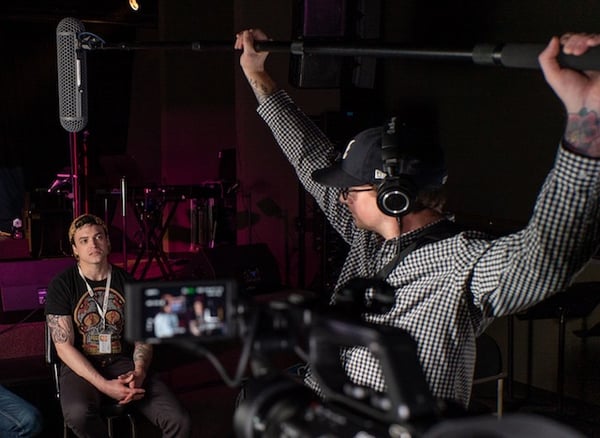
Careers Students Can Pursue After Graduation
A degree in music production from the Atlanta Institute of Music and Media equips students with the technical expertise and hands-on experience to pursue a variety of careers in music production and audio recording.
Graduates can explore roles as:
- Music Producers
- Sound Engineers
- Audio Engineers in state-of-the-art recording studios
- Digital Audio Workstation specialists
- Music Production Industry professionals
With a foundation in music technology and audio production, graduates are well-prepared to navigate the entire music production process in a hands-on studio environment.
Whether aiming for a career in sound engineering or as a music producer, the degree option at the Atlanta Institute of Music and Media provides the expert-level education needed to excel.
Associate of Applied Science in Music Production and Audio for Media
Music Production Technical Courses
Core Courses — Students Must Complete 53 Credits
| Course Number | Course Title | Credits |
| RCD100 | Pro Tools 101 * This course introduces basic principles a student needs to understand how to complete a ProTools project, from initial setup to final delivery. Topics include purposes and uses of edit tools, modes, various track and signal clip functions for recording, editing, and importing audio, MIDI, and video used for music and media production. Included with the course textbook are media files for Pro Tools 101 exercises and hands-on projects. |
2 |
| RCD101 | Critical Listening Skills * This course will cover essential listening skills in relation to music production, from recording to mixing. Topics focus on recognizing essential music and production components including beats and note values, identifying time signatures, key signature, natural major and minor scales, and recognizing octaves of frequencies. |
1 |
| RCD110 | Basic Keyboarding Skills * In this course, the students are introduced to the keyboard layout, playing techniques and scales and chords. The course curriculum progresses to include all aspects necessary for proper keyboard operation for MIDI and music production.Corequisite : RCD120 Music Theory Basics |
2 |
| RCD120 | Music Theory Basics * This course Introduces students to the basic elements of sound and pitch, rhythm and meter, scales and key signatures, chords and progressions and other aspects needed to understand basic music concepts from a technical perspective. Corequisite : RCD110 Basic Keyboarding Skills |
2 |
| RCD130 | MIDI: Synthesis And Sequencing * This course is an introduction to the MIDI language, using Ableton Live and Native Instrument’s Komplete Bundle as the vessel of instruction. This course demonstrates core concepts such as the basic MIDI environment, sequencing, sampled-based and synthesis instruments, automation, and final steps for MIDI-based production including mixing and effects processing. |
4 |
| RCD140 | Introduction to Audio Production 1 * This course gives the student an introduction to, and a strong foundation in, audio production techniques, including an introduction to analog recording history, physical properties of sound, basic microphone types, recording environments, mono and stereo microphone techniques as well as basic analog signal flow and analog signal processing including equalization and dynamic processing techniques. |
3 |
| RCD150 | Skills Lab * This lab course is designed to help the student gain awareness of “soft skills” such as behavior, habits, work ethic, etc. in a fun and engaging way. Students will complete the course with a better understanding of their own strengths and areas in need of improvement. Students will gain tools to help them succeed in their academics and beyond. |
1 |
| RCD200 | Pro Tools 110 * This course builds on the introductory Pro Tools 101 course, evolving basic Pro Tools principles while providing the student with the essential processes needed to complete a Pro Tools project, from initial set up to final mixdown, and to take the Avid Pro Tools 110 Specialist Certification exam. The course teaches intermediate Pro Tools techniques, covering key concepts and skills needed to operate a Pro Tools system. Topics include Hardware I/O setup and routing, Elastic Audio, internal Bus path usages for send/returns, automation, and more. Included with the course textbook are media files for Pro Tools 110 exercises and hands-on projects. Students in good standing will have the opportunity to take the Avid Pro Tools 110 Specialist Certification exam upon course completion. Prerequisite : RCD100 Pro Tools 101 |
2 |
| RCD205 | Studio Interconnect Basics * This course teaches the basics of studio connections and routing of electronics, various types ofanalog and digital cables and connections, and soldering basics, developing necessary skills commonly needed in professional and home studio environments. |
2 |
| RCD220 | Studio Acoustics Basics * This course expands upon the basic principles of acoustics in recording studio environments including analysis and measurement of acoustic related issues. Students will learn various solutions concerning room acoustic treatment, concert halls, and recording studio environments. |
1 |
| RCD231 | MIDI: Sampling and Composition * Building on the previous MIDI Production course, this course introduces industry-standard processes and techniques used to record, edit, and create a sample-based MIDI instrument, enhancing realism in MIDI-based productions with attention to sound and timbre, tone production, and tempo-mapping, as well as covering standard commercial music cues for visual media, such as composition of music beds for film or television. Prerequisites : RCD100 Pro Tools 101, RCD130 MIDI: Synthesis and Sequencing |
2 |
| RCD240 | Introduction to Audio Production II * This course gives the student a more advanced introduction and foundation to audio production techniques including principles of analog and digital audio production and recording and data storage and playback media for digital audio formats. The student will gain an advanced understanding of large format analog console signal flow, time-based processors and an introduction to plug-in processing. Prerequisite : RCD140 Introduction to Audio Production I |
3 |
| RCD255 | Applied Computing Basics * This class covers the basics of computer components and software essential to maintenance and use in audio production studio applications. While the information in this course is universally applicable, it retains a strong focus on the Mac OS X® computing platform, which is the industry-standard operating system for professional digital media. |
2 |
| RCD300 | Pro Tools 201 This course covers core concepts and skills needed to operate an Avid Pro Tools HD/Ultimate system in a professional studio environment, Included with the course textbook are media files for Pro Tools 201 exercises and hands-on projects. Prerequisite : RCD200 Pro Tools 110 |
2 |
| RCD320 | Electronic Music Prodution In this course, students will gain a broad understanding of the tools, production techniques and processes needed to successfully produce music and audio in the contemporary market. Techniques covered include working with and warping audio content in Ableton Live, use of various types of synthesized and drum machine sounds, MIDI and audio effect processors including arpeggiators, filters, saturation, sidechain compression, and more, while utilizing Ableton Live’s Racks and unique Session view for a digitally-based live performance setup and presentation. Prerequisite : RCD130 MIDI: Synthesis and Sequencing |
4 |
| RCD330 | DAW Editing and Processing * This course covers vital tools and processes of audio editing and production techniques used in the industry by musicians, engineers, producers and sound designers. Subjects range from integrated functions in popular DAW.s such as playlist compositing, time-alignment tools, sample replacement, and vocal and instrument tuning with Antares Auto-Tune, Celemony Melodyne, and many more topics. Prerequisite : RCD100 Pro Tools 101 |
2 |
| RCD420 | Introduction to Music Production This course offers hands-on experience of the complete process for a professional music production inside AIMM studios, from beginning to end. The course moves the student through all stages of a music production from planning, to tracking demos, cutting basics, overdubs, vocal production, mixing and mastering. In each phase, students will learn a professional approach along with cutting edge techniques to utilize. In class, students will work with musicians and artists, and cover various roles utilized. Prerequisite : RCD240 Introduction to Audio Production II |
4 |
| RCD410 | Science and Art of Mastering This course provides an overview of concepts, techniques, equipment and environments used in the process of mastering a record. Topics include outlining the differences between a mixing engineer and mastering engineer, use standard mastering tools and approaches with digital software, and types of delivery standards required for various platforms and release formats, including digital streaming to vinyl records. Prerequisite : RCD100 Pro Tools 101 |
1 |
| RCD430 | Music Business * Students will learn about the music business through a series of lectures covering copyrights, entertainment agency contacts, trademark/service mark, resume creation, tax deductions, artist management and split agreements. the changing record industry, performing rights organizations, demo and pro-tape kit creation and health and safety of the engineering industry. |
1 |
| RCD460 | Introduction to Audio Post Production In this course, students are introduced to all of the necessary processes for working with audio in post production scenarios. Students are taught uses of location equipment and mixing, dialogue recording and editing (ADR), sound effects with foley and sound design, working with time code, synchronization, and overall workflow and delivery standards necessary to be successful in the modern independent and professional audio market. Prerequisite : RCD200 Pro Tools 110 |
4 |
| RCD360 | Sound Design for Game Audio In this course students will use the Pro Tools 130: Pro Tools for Game Audio textbook and are provided exercise files in conjunction with the Unity gaming software for implementing sounds in a virtual gaming environment. Students will receive a basic introduction to interactivity in an actual game environment. Students in good standing will have the opportunity to take the Avid Pro Tools 130 Specialist Certification exam upon course completion. Prerequisite : RCD460: Introduction to Audio Post Production |
3 |
| RCD401 | Audio Post Production Techniques This course covers specific techniques for working with advanced Avid Pro Tools sessions in a professional post production environment, including topics such as standards and use of time code, synchronization of audio with video systems and formats for visual media, and more. Included with the course textbook are media files for Pro Tools 210P exercises and hands-on projects. Students in good standing will have the opportunity to take the Avid Pro Tools 210P Professional Certification exam upon course completion. Prerequisite : RCD460: Introduction to Audio Post Production |
2 |
| RCD500 | Location Sound 1 In this course students will obtain the knowledge of gathering sound for a television or film production in the field. Techniques for capturing clean, consistent, and intelligible audio during the filming or taping of a production will be explored and implemented through hands-on exercises. Prerequisite : RCD460: Introduction to Audio Post Production |
3 |
| Total | 53 | |
Elective Courses — Students Choose 15 Out of 35 Credits
| Course Number | Course Title | Credits |
| RCD470 | ADR and Foley In this course students work on recording and performance of both Foley and Automated Dialogue Replacement (ADR), emulating the professional skills having to do with microphone technique, proper dialogue recording for post; both single ADR and group ADR; and recording and performing Foley. Props, surfaces and performance techniques are emphasized. Prerequisites: RCD100-300 Pro Tools 101, 110, 201 |
2 |
| RCD510 | Sound Design for Film Audio In this course students will gain a deeper understanding and awareness of Sound Design methods used in modern day films and entertainment. Techniques in sound synthesis, editing, creating, and mixing will be explored and analyzed as well as critical listening and basic understanding of the history of sound design in film. |
3 |
| RCD530 | Portfolio and Web Media* In this course students will gain the knowledge necessary to market themselves in the ever changing audio industry. This course will help students connect their academic work and studio experiences to a digital environment where they can present themselves to employers in a professional manner. The students will analyze and create business card templates, digital showreel demos for online platforms, and deliver an electronic portfolio for completion of the program. Prerequisite: RCD130 MIDI: Synthesis and Sequencing |
3 |
| RCD520 | Location Sound II In this course students will use the knowledge gained from the Location Sound I course to record location audio for both mock and real production sound situations. The student will record dialog for actual filming scenarios that reflect professional demands and applications. Prerequisites: RCD200 Pro Tools 110; RCD460 Introduction to Audio Post Production; RCD500 Location Sound I |
4 |
| RCD540 | Mixing Audio for Post Production In this course students will gain a deeper understanding of multi-channel setup and techniques for dialogue, sound effects, and music, in relation to monitoring, mixing, and delivery formats for working with film, television, and other forms of visual media. Prerequisites: RCD100-300 Pro Tools 101, 110, 201 |
4 |
| RCD350 | Introduction to Live Sound This course introduces all aspects of live venue sound systems and production, including signal flow for live applications, front of house and monitoring sound systems, speaker set up and rigging, microphone techniques for live applications, mixer routing and controls, proper power requirements and set up, room EQ, and communication with artists/musicians. The class is comprised of a one-hour lecture paired with a one-hour lab where students will practically apply the skills covered in lecture. |
2 |
| RCD444 | Advanced Music Production In this comprehensive, hands-on course, students utilize any & all subject matter from previous courses while introducing advanced music production techniques and approaches such as multi-microphone drum tracking to guitar reamping, compositing, editing, and mixing. The student will create and deliver an original music production, from initial composition to tracking all necessary instruments utilizing engineering techniques and a final product delivery, evolving the setup of a DAW session to meet the needs of a professional music production scenario. The product generated in this course can be used in the student’s audio portfolio to aid in securing job opportunities in the industry. Prerequisites: RCD140-340 Introduction to Audio Production I-II; Introduction to Music Production: |
6 |
| RCD400 | Pro Tools 210M This course covers specific techniques for working with advanced professional Avid Pro Tools systems in a music production environment. The main topics in this course are followed by exercises that allow the student to practice concepts taught in class. Included with the course textbook are media files for Pro Tools 210M exercises and hands-on projects. Students in good standing will have the opportunity to take the Avid Pro Tools 210M Operator Certification exam upon course completion. Prerequisites: RCD100-300: Pro Tools 101, 110, 201 |
2 |
| RCD435 | Methods of Mixing This course covers the history, psychology, and mechanics of mixing including topics such as balance and arrangement of the mix, use of stereo field, equalization, effects and dynamics, monitoring, printing various common versions of the mix, and digital mixing with plugins. Prerequisite: RCD200 Pro Tools 110 |
5 |
| RCD550 | Media Composer Fundamentals I | 2 |
| RCD560 | Media Composer Fundamentals II |
2 |
| Total | 35 | |
| Minimum Number of Elective Credits Required | 15 | |
Required General Education Courses — Students Must Complete 24 Credits
| Course Number | Course Title | Credits |
| HUM110 | Creative Writing* This course covers different kinds of writing across multiple genres, including—but not limited to—poetry, fiction, nonfiction and hybrid forms. Students will be encouraged to experiment with these forms of writing, to step out of their comfort zone and challenge their own preconceptions of where writing can take them. The great Russian writer Anton Chekhov once said, “don’t tell me the moon is shining; show me the glint of light on broken glass.” In essence, Chekhov is illustrating one of the most important principles of creative writing: the act of describing through imagery rather than simply “telling.” This course will take Chekhov’s dictum to heart by practicing reading and writing in each genre with an eye towards drafting, writing, and revising original compositions. |
3 |
| HUM115 | English Composition* This class introduces students to the fundamentals of writing. Students will study standard English grammatical and syntactical conventions to ground our composition skills in the systems and structures that will make our writing legible to a general audience of standard English readers. Students also practice brainstorming, drafting, and revising in order to learn about the writing process, identify what works for us individually, and work towards making our processes more productive. Students will regularly apply what we have learned to different formal and informal genres to understand the transferability of standard English writing conventions and the praxis of writing texts across varying styles, forms, and purposes. |
3 |
| HUM120 | Music Appreciation* |
3 |
| MAT110 | Accounting* This course teaches the fundamental accounting and tax information needed to create a successful sound career in the music industry and digital media industries. It will include basic accounting and tax elements, information on setting up a business, selecting the appropriate type of business entity, and accounting aspects as related to various music and intellectual property transactions. |
3 |
| MAT120 | Mathematical Modeling* This course covers applied algebra, linear, piecewise, exponential and quadratic functions. It focuses on logical problem-solving techniques required for critical thinking. Statistical analysis and probability will be used to analyze and explore real world data. In addition, students will develop a clear understanding of the role and function of quantitative analysis. This unit also focuses on skills needed to ensure students acquire better decision-making processes for money management in their personal and business lives. |
3 |
| SCI110 | Principles of Electronics* |
3 |
| SCI120 | Physics of Sound* This course introduces students to the physical nature of music and sound. Waves, sound propagation, harmonic content, the human hearing mechanism and musical instrument tone production are discussed. Psychoacoustics and perception of sound are included. |
3 |
| SOC110 | Cultural Anthropology* Anthropologists take a broad approach to study and understand different aspects of the human experience. This course explores how people in different places live, use music, and interact with the world around them. Students will analyze select case studies from around the world. They will study the perspectives, practices, and social organization of other groups whose values and lifeways may be very different from their own.The knowledge they gain will enrich human understanding on a broader level. Special importance will be placed on global music styles that impact contemporary music including Indian classical music, West African Music, Brazilian Samba, Cuban music styles, and African-American folk music. |
3 |
| Total | 24 | |
| Program Total | 92 | |
Additional Music Program Options
Program Features
- Courses 38
- Credit Hours 92 hours
- Skill level Intermediate
- Language English
- Currently Enrolling Yes
